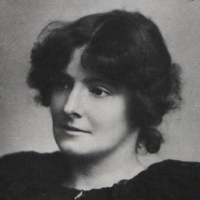In Memoryt of Saretta Deakin
_Who Died on October 25th_, 1899.
THERE was a day,
A horrible Autumn day,
When from her home, the home she made for ours
And that day made a nightmare of white flowers
And folk in black who whispered pityingly,
They carried her away;
And left our hearts all cold
And empty, yet with such a store to hold
Of sodden grief the slow drops still ooze out,
And, falling on all fair things, they wither these.
Tears came with time—but not with time went by.
And still we wander desolate about
The poor changed house, the garden and the croft,
Warm kitchen, sunny parlour, with the soft
Intolerable pervading memories
Of her whose face and voice made melodies,
Sweet unforgotten songs of mother-love—
Dear songs of all the little joys that were.
We see the sun, and have no joy thereof,
Because she gathered in her dying hands
And carried with her to the fair far lands
The flower of all our joy, because she went
Out of the garden where her days were spent,
And took the very sun away with her.
The cross stands at her head.
Over her breast, that loving mother-breast,
Close buds of pansies purple and white are pressed.
It seems a place for rest,
For happy folded sleep; but ah, not there,
Not there, not there, our hardest tears are shed,
But in the house made empty for her sake.
Here, in the night intolerable, wake
The hungry passionate pains of Love still strong
To fight with death the bitter slow night long.
Then the rich price that poor Love has to pay
Is paid, slow drop by drop, till the new day
With thin cold fingers pushes back night’s wings,
And drags us out to common cruel things
That sting, and barb their stings with memory.
O Love—and is the price too hard to give?
Thine is the splendour of all things that live,
And this thy pain the price of life to thee—
The sacrament that binds to the beloved,
The chain that holds though mountains be removed,
The portent of thine immortality.
So, in the house of pain imprisoned, we
Endure our bondage, and work out our time,
Nor seek from out our dungeon walls to climb—
Bondsmen, who would not, if we could, be free.
Thank God, our hands still hold Love’s cord—and she—
Do not her hands still clasp the cord we hold,
Drawing us near, coiling bright fold on fold,
Till the far day when it shall draw us near
To the sight of her—her living hands, her dear
Tired face, grown weary of watching for our face?
And we shall hold her, in the happy place,
And hear her voice, the old same voice we knew—
‘Ah! children, I am tired of wanting you!’
Or, in some world more beautiful and dear
Than any she ever even dreamed of here,
Where time is changed, does she await the day
She longed for, and so little a while away,
When all the love we watered with our tears
Shall bloom, transplanted by the kindly years?
Dreaming through her new garden does she go,
Remembering the old garden, long ago,
Tending new flowers more fair than those that grow
In this sad garden where such sad flowers blow;
And, fondly touching bud and leaf and shoot,
Training her flowers to perfect branch and root,
Does she sometimes entreat some darling flower
To wait a little for its opening hour?
Can you not hear her voice: ‘Ah, not to-day,
While my dear flowers, my own, are far away.
Be patient, bud! to-morrow soon will come:
Ah! blossom when my little girl comes home!’
But now. But here.
The empty house, the always empty place—
The black remembrance that no night blots out,
The memories, white, unbearable, and dear
That no white sunlight makes less cruel and clear?
The resistless riotous rout
Of cruel conquering thoughts, the night, the day?
Love is immortal: this the price to pay.
Worse than all pain it would be to forget—
On Love’s brave brow the crown of thorns is set.
Love is no niggard: though the price be high
Into God’s market Love goes forth to buy
With royal meed God’s greatest gifts and gain,
Love offers up his whole rich store of pain,
And buys of God Love’s immortality.
Login to comment.

